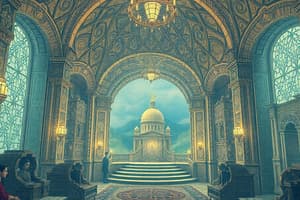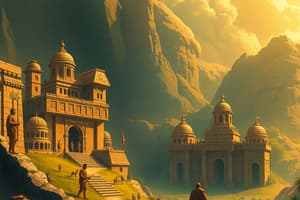Podcast
Questions and Answers
What was one significant result of the Columbian Exchange?
What was one significant result of the Columbian Exchange?
- Independent development of agriculture in the New World
- Spread of diseases to the Old World
- Introduction of new crops to both worlds (correct)
- Increased biodiversity in Europe
Which movement is characterized by the promotion of reason and empirical observation?
Which movement is characterized by the promotion of reason and empirical observation?
- Romanticism
- The Enlightenment (correct)
- Baroque movement
- The Renaissance
What was one major consequence of the Industrial Revolution?
What was one major consequence of the Industrial Revolution?
- Significant urbanization (correct)
- Rise of agricultural societies
- Stagnation of technological advancements
- Decrease in urban population
Which event significantly shaped the 20th century politically and economically?
Which event significantly shaped the 20th century politically and economically?
What is one of the ongoing challenges in the contemporary world?
What is one of the ongoing challenges in the contemporary world?
What was a significant consequence of the fall of the Western Roman Empire?
What was a significant consequence of the fall of the Western Roman Empire?
Which river valley civilization is known for its advanced urban planning?
Which river valley civilization is known for its advanced urban planning?
How did the Byzantine Empire contribute to classical traditions?
How did the Byzantine Empire contribute to classical traditions?
Which civilization is associated with the development of democracy and philosophy in ancient times?
Which civilization is associated with the development of democracy and philosophy in ancient times?
What economic development facilitated cultural exchange between continents in the post-classical world?
What economic development facilitated cultural exchange between continents in the post-classical world?
What system characterized the political structure of medieval Europe?
What system characterized the political structure of medieval Europe?
Which empire is recognized as a continuation of the Roman Empire's eastern segment?
Which empire is recognized as a continuation of the Roman Empire's eastern segment?
Which of the following was not a unique characteristic of early civilizations?
Which of the following was not a unique characteristic of early civilizations?
Flashcards
Columbian Exchange
Columbian Exchange
The exchange of plants, animals, and diseases between the Old World (Europe, Asia, and Africa) and the New World (the Americas) following Christopher Columbus's voyages.
Scientific Revolution & Enlightenment
Scientific Revolution & Enlightenment
A period in European history characterized by a shift from traditional beliefs to reason and empirical observation, leading to advancements in science and technology.
Industrial Revolution
Industrial Revolution
A series of technological innovations, particularly in Britain, that led to the mechanization of production, increased efficiency, and the rise of factories and cities.
Imperialism & Colonialism
Imperialism & Colonialism
Signup and view all the flashcards
Globalization
Globalization
Signup and view all the flashcards
Early Civilizations
Early Civilizations
Signup and view all the flashcards
River Valleys
River Valleys
Signup and view all the flashcards
Ancient Greece
Ancient Greece
Signup and view all the flashcards
Roman Empire
Roman Empire
Signup and view all the flashcards
Rise of Islam
Rise of Islam
Signup and view all the flashcards
Silk Road
Silk Road
Signup and view all the flashcards
Byzantine Empire
Byzantine Empire
Signup and view all the flashcards
Feudalism
Feudalism
Signup and view all the flashcards
Study Notes
Early Civilizations
- Early civilizations emerged in diverse regions like Mesopotamia, Egypt, the Indus Valley, and China around 3500-1500 BCE.
- These societies developed complex political structures, agricultural systems, and writing systems.
- River valleys (Nile, Tigris-Euphrates, Indus, Yellow River) fostered population growth and agricultural development.
- Unique characteristics developed in each civilization: Mesopotamian city-states, Egyptian pharaoh-led dynasties, Indus Valley urban planning, and Chinese dynastic cycles.
Classical Civilizations
- Ancient Greece's city-states championed democracy and philosophy, impacting Western thought and political systems.
- The Roman Republic and Empire constructed extensive infrastructure, legal systems, and wielded military power across the Mediterranean.
- Roads, aqueducts, and codified laws shaped Roman governance and expanded their empire.
- Greek and Roman advancements in art, architecture, and philosophy profoundly influenced later European and global cultures.
Post-Classical World
- The rise of Islam from the 7th century profoundly impacted the Middle East, North Africa, and parts of Europe.
- Trade routes like the Silk Road facilitated cultural exchange and economic growth across continents.
- The Byzantine Empire, an extension of the Roman Empire's east, endured for centuries, preserving classical traditions and contributing to art and literature.
- Major empires and kingdoms prospered including the Tang Dynasty in China, the Khmer Empire, and the Islamic Caliphates, each with unique social, political, and economic structures.
Medieval Europe
- The collapse of the Western Roman Empire marked the beginning of the Middle Ages.
- Feudalism, a system built on land ownership and loyalty, decentralized European political power.
- The Catholic Church (monasteries and the Papacy), significantly influenced daily life, laws, and learning.
- Medieval society was predominantly agricultural, characterized by a rigid social hierarchy, and the growth of towns and trade.
Age of Exploration and Enlightenment
- European exploration between the 15th and 17th centuries connected various regions.
- The Columbian Exchange (transfer of plants, animals, and diseases between Old and New Worlds) had significant consequences.
- The Scientific Revolution and the Enlightenment promoted reason and empirical observation, challenging traditional beliefs.
- This period saw the dawn of global interconnectedness, shifts in scientific thought, and the rise of nation-states.
Modern Era
- The Industrial Revolution, originating in 18th-century Britain, spurred rapid technological change and urbanization.
- Nationalism and political uprisings shaped 19th and 20th-century governance and the rise of nation-states.
- Imperialism and colonialism significantly impacted numerous regions economically and politically.
- The 20th century witnessed two world wars, the Cold War, and the growth of globalization and new political/economic structures.
Contemporary World
- The last century witnessed rapid advancements in technology, communication, and global interconnectedness.
- Significant political and economic transformations – including the rise of global powers, the fall of communism, and challenges like globalization and terrorism – continue to influence the modern world.
- Globalization, democratization, and environmental sustainability challenges define the modern world.
Global Themes
- Understanding trade, cultural exchange, and conflict are crucial for comprehending history.
- The rise and fall of civilizations showcase enduring patterns and influences.
- Analyzing interconnections between global events provides holistic understanding.
- Interactions and exchanges between societies shaped the world's historical course.
Studying That Suits You
Use AI to generate personalized quizzes and flashcards to suit your learning preferences.




